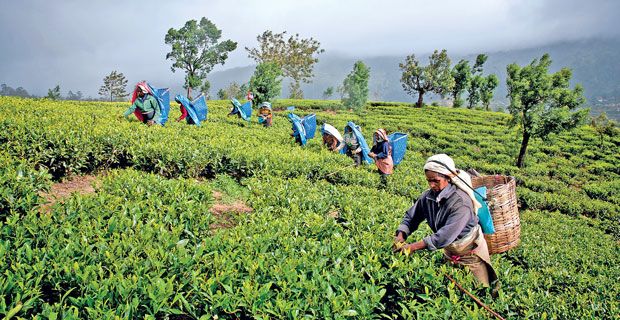28 Dec 2016 - {{hitsCtrl.values.hits}}

 We salute Prime Minister Ranil Wickremesinghe for his calculated and dedicated efforts in intervening genuinely to uplift the ailing industry. However, we regret that we are unable to say the same regarding President Maithripala Sirisena as he seems to have ignored the sector amidst many communications directed to him. We anticipate this attitude may be changed for better in the coming year.
We salute Prime Minister Ranil Wickremesinghe for his calculated and dedicated efforts in intervening genuinely to uplift the ailing industry. However, we regret that we are unable to say the same regarding President Maithripala Sirisena as he seems to have ignored the sector amidst many communications directed to him. We anticipate this attitude may be changed for better in the coming year.
All responsible citizens, learned professionals and decision makers must understand the negative and social impacts the plantation industry could engender on the national economy as a whole, if left unattended to. We need the assistance of the scholars to take a lead in this gigantic task. We thank the media for all the support extended to us in the last season. The same assistances may be continued in the seasons to come as well.
Owners, managers and employees
This is not the opportunity to waste everyone’s time by criticizing the current state of affairs of the industry. However, we believe that the industry today remains a ‘world-class case study’ for mismanagement and is being killed due to poor quality decision-making. Wrong and unsustainable policies set by the successive governments since the initial nationalization of the plantations too are to be blamed, to begin with.
We feel sorry as we believe that some of the owners of the regional plantation companies (RPCs) are fed with garbage by the heads of certain RPCs at times. Blindfolding the superiors with sinister motives attached to these strategies is not the short supply in the plantation culture right from the very inception. May be it has gone high tech during the present times amplifying the impact.
Quick hiring and firing are absolute needs of the industry mainly to improve discipline on the plantations managed by RPCs and we hope new laws will come into play just like heavy fines proposed for traffic offences.
If you are disciplined then there is nothing to be scared about. When it comes to discipline on plantations the only formula that works is usually known as the ‘benevolent dictatorship’. You will realize the validity of this concept even to date, if you refer back to the golden era of plantations in Sri Lanka or pre-nationalization era in short. However, this kind of punishments should be first levelled against those deserving corporate employees of certain RPCs through the already available powers under the Companies’ Act 2007. This act is a tiger with teeth.
That’s why the most famous quotes are still in existence in planting that suggests ‘the best manure to the plantation field is shoe leather’. Without MBWA (management by walking about) even a president of a country will not be able to manage for results. In the Sri Lankan culture, the results are known only when the report card is delivered following the term test or the general elections as known by all.
The decision makers at all levels of certain RPC-managed plantations have failed to capture the much spoken ‘change’ affecting every business in the world primarily undertaken to make profits. We don’t think that we have investigated into the root cause analysis of these RPCs adequately in the last season. As pointed out in the past, if mismanagement has led to financial frauds depriving the salaries and benefits to the employees and taxes due to the state/public, such personnel must be removed from their seats along with all those henchmen aided and abated them to steal the national wealth and to build castles for themselves – Rob Peter to pay Paul?
Employees
Surprisingly, most managers managing plantations do not know how the plant is growing. They cannot explain the scientific process of photosynthesis. It’s an outcome of wrong recruitment. No other country that has plantations recruits other than agriculture or science graduates into plantation manager positions. Even to become a plantation field officer, some plantation companies overseas are looking for a basic science or agriculture degree.
When these young, dynamic and eminent personalities climb up the ladder to take up higher positions, they are given different sets of skills objectively so that they could handle their jobs without becoming a burden to the business. This applies to other categories of employees such as the staff and workers alike. Due to the lack of this facility, some are on piggy back on employees. Demotivation impacts the
bottom-line.
So the dire need of application of HRM principles should come loud and clear when planning the industry-related issues in the new season. We can learn how HRM has been effective from all those RPCs that are doing extremely well under the same harsh conditions here even now. The actual reason behind their success is that they are ‘change enabled’ and the losers are not.
Product
Long life is the expectation of every consumer except suicides – its antioxidants in tea that perform this need of the long life of the consumer. But without addressing this need, all are expecting the buyers to give us gold in exchange of meaningless tea. So we have to wake up and respond to this reality in the new season. If we address this issue, it will lead to so many highly important process improvements in black or green tea production. The cost can be brought down if the LTP machine is used, like in African countries. LTP was available in Sri Lanka before Kenyans started using it. Both Manthri Delvita and Patrick Panabokke are still living to speak this truth, loud and clear. Do we have to manufacture refuse tea to throw out at the end? Will we have skilled tea pluckers for a long time in the future? Why are we blind to available alternatives?
Smart plantations
Plantations can be turned around easily due to their rich asset bases and energy banks. These are social entities that resemble a country within a country. The system is so unique that the manager of a plantation could be very much compared with a president of a country. But the systems in place in most plantations are much outdated and a hindrance to their performance – starting with the underdeveloped IT and ICT to compete with the modern world. We are appreciating the work already done by Harin Fernando but a more systematic approach is needed for the industry in the coming season.
Plantations must be looked at as land-based investment opportunities rather than business entities that make raw materials for the developed world to make super profits. Every plantation may require a website that works well with digital marketing and an electronic payment gateway. Every plantation is capable of making a finished product and the revenue generated out of sales must come back to the plantation thus giving them the benefit of their labour.
Currently, most RPCs do not make use of IT/ICT, marketing, engineering, finance, HRM and scientific operational professionals. This is why we need to have the CEO positions of the RPCs filled with MBA graduates who know how to use the strengths of other professionals. We need to have the level playing field to compete with our competitors in other parts of the world.
Mobile phone planting is not about using IT/ICT to manage crops, instead intensive walking around the fields with eyes widely opened.
We have given comprehensive proposals detailing how to resurrect the industry to Planatation Industries Minister Navin Dissanayake. He has given the Planters’ Association its deserving place. We presume that he is slow but steadily progressing without rocking the boat too much.
The state has to make certain decisions in terms of policy fast because time is money today. We expect the state to increase the retirement age to 65 years of all private and state employees in 2017. This decision alone will help lot more quality and competent planters to get back to the industry whilst the existing talent to remain in their much-needed positions.
We are well aware that the New Year is full of challenges. The prevailing situation is not only applying to Sri Lankans but to the whole world. This is the time we got to stick together. Our dream is a faster journey towards the US $ 10 billion dream the planters have set for the industry by 2020. We need the support of the state to make it happen. We are open for discussion at any time. All planters, staff and workers are ready to shoulder these challenges.
(Lalin I. De Silva can be contacted through [email protected])
10 Jan 2025 29 minute ago
10 Jan 2025 46 minute ago
10 Jan 2025 1 hours ago
10 Jan 2025 2 hours ago
10 Jan 2025 3 hours ago